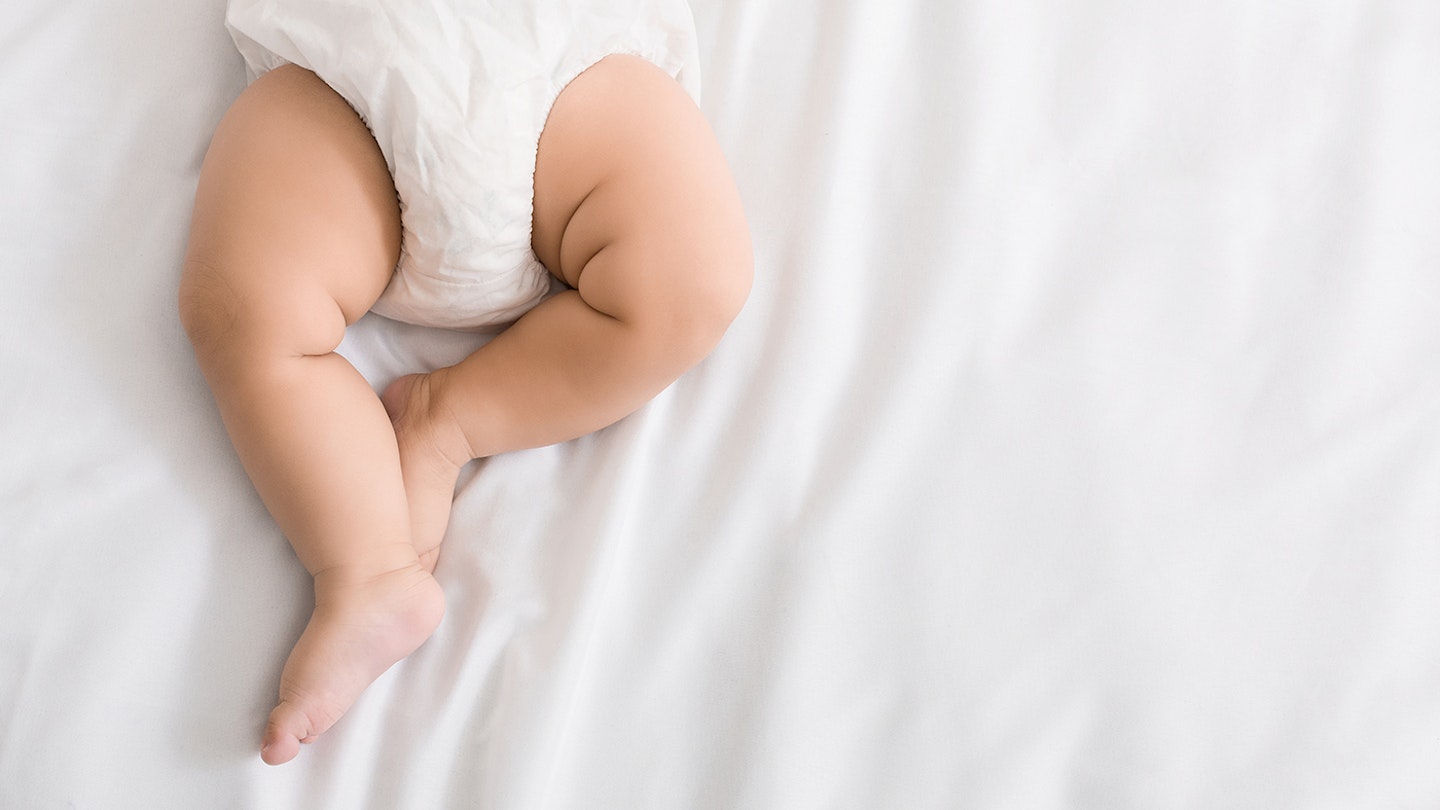
Medically Reviewed by: Dr José Costa, MD
As a new parent, one thing you'll find yourself doing regularly - apart from feeding - is changing your newborn’s nappies. Newborns tend to feed every 2-3 hours, so, understandably, it has to come out the other end as baby poop or, of course, wee.
While it might not be the most talked-about topic, understanding the colour, smell, and frequency of baby pee can give you valuable insight into their hydration and overall health.
The first thing to note is that your baby's urine should normally be pale yellow and odourless. But while changes in baby pee can be confusing or even alarming, most are normal and easily explained. To help you decipher your baby's pee, we spoke to Dr José Costa, consultant paediatrician and senior allergy consultant, to get his advice.
Baby’s pee smells – what does it mean?
1) Strong-smelling urine
Smelly urine can certainly take the cute factor down a few notches! Strong-smelling urine can be due to many things. "Some foods, such as asparagus, can give urine a stronger smell. The same will happen with certain medications, notably antibiotics. Health conditions, like diabetes, urine infection, kidney problems or metabolic disorders, will create very specific smells. In the case of a urine infection, the odour tends to be quite foul, and the urine will be cloudy," explains Dr Costa.
If your baby has a UTI, they may also:
• be irritable
• have a fever
• be peeing a lot more than often
• showing discomfort whilst peeing
Signs of an infection could include:
• blood in your baby’s pee
• pee that looks cloudy
• a strong smell in your baby's urine
2). Sweet-smelling urine
If the baby's wee smells a little like maple syrup, it may indicate a serious illness called Maple Syrup Urine Disease (MSUD) – yes, that's a thing! The NHS says it's an inherited condition; "It means the body cannot process certain amino acids (the 'building blocks' of protein), causing a harmful build-up of substances in the blood and urine." Signs for MSUD usually occur within the first few days of birth, or between five months and seven years. Sweet-smelling urine can also be a sign of diabetes. Both of these are serious conditions, so if your baby’s pee smells sweet, contact your healthcare provider.
3) Breastfed vs formula-fed pee
Formula-fed babies often have a slightly stronger smell in their pee, and it's usually darker compared to breastfed babies. "This is due to different metabolite content in the urine, as the ingredients in both are slightly different", explains Dr Costa.
Baby pee colour
Just like adults, a healthy baby's wee colour is usually light to dark yellow. This colour may change from time to time, but if your baby’s pee smells particularly strong or unusual, it could be worth consulting your healthcare provider to ensure everything is okay. Sometimes subtle signs can be early indicators of dehydration or infection in newborns.
Check out our baby pee colour chart below for a quick indication of what your baby’s pee colour means

Light to dark yellow baby pee
Light yellow pee is a good, healthy sign. Dark amber/honey and orange pee could indicate your baby is a little dehydrated, so you should increase your baby’s fluid intake. Dark yellow pee could also indicate your baby has jaundice.
Orange, red or brown baby pee
The medical term for blood in urine is hematuria, and this is not normal for either boys or girls (after one week old) and usually indicates a problem. If you spot this, contact your child’s healthcare provider.
Brick dust, red, brown or pink baby pee
Red/ brown urine colours could be a sign of blood in your baby’s urine, so you should seek medical advice immediately.
"Doctors often refer to dark red coloured urate crystals that can be found in newborn babies’ nappies in the first few weeks of life as 'Brick Dust'. These crystals are made of uric acid, which is found in the blood and excreted in our urine - they are a result of your baby’s urine being more concentrated as they build up their fluid intake. If you notice urate crystals in your newborn’s nappy, seek immediate advice from your healthcare provider to support you in increasing your baby’s fluid intake through either breast or formula feeding." Explains Dr Costa.
Cloudy baby pee
This could be a sign that your baby is suffering from a UTI or kidney infection. If this occurs, contact your child’s healthcare provider immediately and more so if there’s also blood in it.
How often should my baby pee?
Typically, 6-8 wet nappies a day is a sign that your baby is getting enough food. Paying attention to these little details can help you keep your baby happy, healthy and hydrated.
Baby is peeing a lot - what does it mean?
If you notice your baby is peeing more than usual, such as more than once every hour, then it's time to contact your child’s healthcare provider. It could be a sign of a urinary tract infection (UTI), "diabetes and on rare occasions, it can be a sign of kidney problems", explains Dr Costa. Other signs can include crying when they pee, having a fever, being irritable, and not wanting to feed.
Baby isn't peeing much – what does it mean?
If you notice your baby is not peeing very often and there are fewer than four nappies a day, they could be ill, have an infection or be dehydrated. If it's very hot, it's normal for urine to sometimes decrease and could drop by half. On the other hand, if your baby is also not feeding well, this would be another reason why they might not be peeing very much. It can be hard to judge if you're breastfeeding, so look out for other signs, i.e if they’re oversleeping or if they seem lethargic. If your baby doesn't pee within 6-8 hours, contact your healthcare provider immediately.
It is rare, but Dr Costa adds that if your baby is not peeing a lot, it can "indicate a condition called 'Posterior urethral valves', which either totally or partially block the urethra, preventing urine from being passed. If the child "dribbles" urine, this should be considered, and urgent medical and surgical intervention is needed."
How often should you change your baby’s nappy?
You're going to be getting through a lot of nappies, so stock up! The NHS advise changing your newborn's nappy whenever they have done a wee or poo in order to keep them comfy and prevent nappy rash. This could be 10-12 times a day at the beginning, but as they get older, this will go down to 6 to 8 times a day. As Dr Costa says, how many nappies you use per day "will vary according to the baby’s age. Initially, the number of wet nappies and bowel motions is relatively low (around once a day). However, as the days pass and they feed more, they will have around 5 to 8 wet nappies and 3 bowel movements a day."
Signs of dehydration in babies
If your baby’s pee smells strong and is highly concentrated, it could be a sign your baby is dehydrated. "Along with fewer wet nappies and amber/orange urine, we can observe a sunken anterior fontanelle, sunken eyes, a lack of tears when a baby cries, dry lips and tongue, and decreased skin turgor (the ability of the skin to return to its normal shape after being slightly stretched)." These are also indicators of dehydration, explains Dr Costa.
Other things to look out for
Some babies may occasionally have dry nappies overnight, even at a young age, and it is quite normal provided they don't exhibit any other signs like dry lips, lethargy, or sunken eyes, as this could indicate dehydration.
If your baby's nappy is leaking, their nappy could be the wrong size or they could be wearing it for too long, and it's become heavy and full. Try sizing up or down and be sure to change the nappy regularly, especially before bedtime.
Baby pee summary
It's worth paying attention to your baby's pee smell and colour when you change their nappy. Pay attention to the number of wet nappies - there should be at least 5-8 wet ones a day or more. A healthy baby has yellow pee - between light and dark. Pink-tinted pee usually means highly concentrated urine, and red, orange, or brown colour pee indicates blood. The smell of their pee can reveal a lot, too - it can be strong without any issues, but if it smells really bad, it could be a sign of a UTI.
FAQs Baby pee
What to do if baby is peeing through the nappy at night?
This may occasionally happen, and if it does, try and change the nappy right before bedtime. It may also be worth sizing up a nappy to ensure a better fit.
How to stop baby boy peeing when changing nappy?
You can cover the baby's genitals with a clean cloth or a small towel to catch any pee. Have a clean nappy ready to slip underneath your baby as soon as you take the dirty one away. If your baby tends to pee immediately after waking up, give it a few minutes before changing the nappy.
What colour is a baby's urine if they have jaundice?
If your baby has jaundice, their pee colour might appear dark yellow. Look out for other signs too, such as yellowing of the skin and whites of the eyes.
Does orange pee mean dehydration?
Yes, orange pee can mean dehydration. If you notice other signs of dehydration (dry nappies, dry mouth diapers, dry mouth, or sunken eyes), consult your GP.
About the expert
Dr José Costa is a senior consultant paediatrician and senior allergy consultant, specialising in the latest research, medical guidance and insight on childhood food allergies, Rhinitis (Hay Fever), Eczema, Asthma and associated conditions. With over 16 years of experience in Paediatrics and 12 years in Paediatric Allergy, Dr Costa is a member of the Royal College of Paediatrics and Child Health.
About the author
Proud aunt to her teen niece, Zara Mohammed is a Digital Writer for Mother&Baby. She has 10 years freelance writing experience creating lifestyle content for various platforms, including pregnancy, women’s health, parenting, child development and child mental health, plus lots of fun seasonal family articles and celebrity news.
